unit 6 sam adams an industrial engineerPPT课件
unit6 Sam Adams, Industrial Engineer

Unit Six Sam Adams, Industrial EngineerTeaching PrinciplesThe teacher is supposed to:1.follow the Teaching Requirements of the College English Course issued by the State Ministryof Education;2.establish a true or simulated environment appropriate for students’ interaction andinvolvement;3.integrate knowledge of language and abilities for practical use;4.introduce relative cultural information about the texts;rm students of some important words and expressions;6.guide students to complete some useful exercises on words and structures of the texts. Teaching Procedures and Time Allotment:Text A Writing for MyselfI. Teaching objectives1. grasp the main idea and structure of the text;2. appreciate the narrative essay skills demonstrated in the text;3.master the key language points and grammatical structures in the text;4. conduct a series of reading, listening, speaking and writing activities related to the unit.II. Time allotment1.Warming- up questions①Are you a well-organized person? Whether your answer is “yes” or “no”, give an exampleor two to illustrate.②Do you consider yourself an efficient person? In what ways are you efficient?③Suppose you were the manager of a factory. How would you arouse your workers’enthusiasm for production?2.Cultural background informationi. Text comprehensionStylistic Features: It is a narrative passage with the first-person narration. This story is about Sam Adams, a “born” industrial engineer. When Sam Adams was a boy, he was the “efficiency expert”for the family. After graduation from the college he was asked to work as a “consultant” in a shirt factory, where he found some problems and thus made some suggestions.ii. Text analysisStructure of the Story:Scan the text then fill in the following table.Possible answer:1. a quality control inspection;2. high, uncomfortable tables;3. dull gray wall;4. 15-minute coffee breaks;5. irregular work flowiii. Vocabulary & StructureLead-inSam set out to improve efficiency at the shirt factory but, as we find out later in this unit, his plans turned out not quite as he had expected.Word & Phrase1. turn out: happen to be or be found to be in the endturn out to be sb./ sth.; turn out that…证明是某人(某事物),原来是…, 结果是e.g. The job turned out to be harder than we thought.这工作结果比我们想的要难。
大学英语精读第一册UnitSix
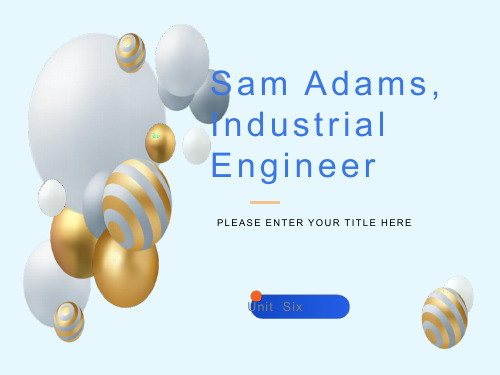
E.g. Our plan turned out not quite successful as expected. (结果,我们的计划没有像期望的那么成功.) His statement turned out to be false. (最后证实他的话是错的。) It turned out that he was Jim’s father. (结果,他就是吉姆的父亲.)
Background Knowledge
美国的教育体系:
美国文化教育的高水平也决定了美国在世界科技方面的领先地位。在美国人看来,每个人都应该有机会接受最好的教育,以发展个人的天赋与能力。从19世纪早期开始,这种义务教育的理想便不断得到群众的支持。许多政教界的领导人物指出,美国的繁荣与强大,事实上是得力于教育之普及。
hold up: (often used in passive voice) delay, get in one’s way 延迟, 耽搁, 阻碍
We are held up for 5 minutes in a traffic jam. (我被一场交通阻塞耽误了5分钟。) The steel strike may hold up the production of cars for several months. (钢铁工人罢工,可能会使汽车生产停滞好几个月。)
2
中、小学教育主要是由各州教育委员会和地方政府管理,多数州实行十年义务教育。各州学制不一,大部分为小学六年、初中三年、高中三年。美国的学校有公立和私立两种,公立学校由政府税收支持,学生免费入学;私立学校多由教会支持,也包括那些合乎相当学院基础的私立学校。在初中阶段,约有10%的人就读于私立或教会学校。在高中阶段,同样约有10%的人就读于私立或教会学校读书。约有20%的大学生是读私立学校或教会学校。
Unit 6 Sam Adam, Industrial Engineer Teaching plan大学英语一
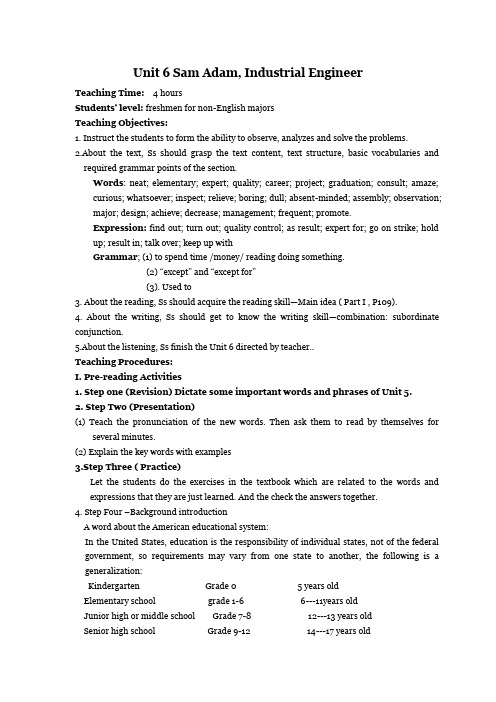
Unit 6 Sam Adam, Industrial EngineerTeaching Time: 4 hoursStudents’ level: freshmen for non-English majorsTeaching Objectives:1. Instruct the students to form the ability to observe, analyzes and solve the problems.2.About the text, Ss should grasp the text content, text structure, basic vocabularies and required grammar points of the section.Words: neat; elementary; expert; quality; career; project; graduation; consult; amaze;curious; whatsoever; inspect; relieve; boring; dull; absent-minded; assembly; observation;major; design; achieve; decrease; management; frequent; promote.Expression: find out; turn out; quality control; as result; expert for; go on strike; hold up; result in; talk over; keep up withGrammar; (1) to spend time /money/ reading doing something.(2) ―except‖ and ―except for‖(3). Used to3. About the reading, Ss should acquire the reading skill—Main idea ( Part I , P109).4. About the writing, Ss should get to know the writing skill—combination: subordinate conjunction.5.About the listening, Ss finish the Unit 6 directed by teacher..Teaching Procedures:I. Pre-reading Activities1. Step one (Revision) Dictate some important words and phrases of Unit 5.2. Step Two (Presentation)(1) Teach the pronunciation of the new words. Then ask them to read by themselves forseveral minutes.(2) Explain the key words with examples3.Step Three ( Practice)Let the students do the exercises in the textbook which are related to the words and expressions that they are just learned. And the check the answers together.4. Step Four –Background introductionA word about the American educational system:In the United States, education is the responsibility of individual states, not of the federal government, so requirements may vary from one state to another, the following is a generalization:Kindergarten Grade 0 5 years oldElementary school grade 1-6 6---11years oldJunior high or middle school Grade 7-8 12---13 years oldSenior high school Grade 9-12 14---17 years oldCollege four years for a B.A or B.S.degreeuniversity 2---3 years for an M.A or M.S.; 2—8 years for a Ph.D. Industrial engineerIndustrial engineering is the detailed analysis of the use and cost of men, materials and equipment in an organization with a view to increasing its productivity, profit and efficiency.Those who are involved in this kind of analysis are called industrial engineers.II. While-reading ActivitiesI. Ss have the silent reading on the text (10 mins)II. Teacher’s presentationAsk the students to keep the questions which are listed after the text in the mindfirst. Then explain the text in detail to the students. The following are the difficultsentences:<1> I f you ask my mother how I happened to become an industrial engineer,she’ll tell you that I have always been one.<2>I Used to organize my father’s tools, my mother’s kitchen utensils, my sister’sboyfriends.<3> so he asked me to come in on a short-term basis as a consultant.<4> most curious of all, there was no quality control whatsoever.<5> Except for a half hour at lunch time, there were no breaks in the day to relievethe boring work..<6> I covered my major points by telling him the following.<7> If excellent work results in frequent pay increases or promotions, the workerswill have greater incentive to produce.<8> we want to keep up with the times. Then ask the students to Grade years oldgive the answers to the questions.III. Language points:The new words and expressions of unit 61, efficien t: the ability to do something well. n.e.g. She booked the plane ticket for us with great efficiency.2. neat: adj. <1>Tidye.g. Mrs. Frank keeps a neat house.<2> cleverly said or done.e.g. The Foreign Minister spokesman gave the reporter a neat answer.You have done neat job.3.expert: <1> a person with special training in a certain field.e.g. Nie weiping is an expert at chess.<2> speciale.g. Nie weiping is an expert at \ in playing chess.4.quality : <1> high degree of goodness.e.g. It is quality, not quantity, that is important.<2> special characteristic of something, or somebody.e.g. The Chinese people are praised for their qualities such as bravery and diligence.5.basis: foundations. ne.g. The two countries established diplomatic relations on the basis of equality and mutualbenefits.On the basis of students’ score in this exam, we can tell that the exam is too difficult.6.consult : v. to go ( a person, book, etc.) for information, advice, etc.e.g. Have you consulted your doctor about your illness?7.whatsoever: adj. Come emphatic than whatever, usually used in negative consult with atall.e.g. he will come for the meeting. There can be no doubt whatsoever about it.Nothing whatsoever can prevent us from carrying out this plan.8.inspect: <1> exame.g. the policeman stopped his car and demanded to inspect his driver’s license.Her job is to inspect the service quality of all KFC stores in shanghai.<2> visiting officiallye.g. the troops are ready for the visiting president to inspect the troops.9.miss: vt. <1> usually in a continuous tense. lack.e.g. my wallet is missing.<2> fail to see , hit , hold , catch , etc.e.g. he fired but missed the target.<3> realize and feel sorry about the absence of.e.g. all of us miss you. Come back as soon as you canJanet missed home a lot when she was studying in France.10.relieve: vt. <1> make less or easiere.g. Aspirin usually reli eve a person’s headache.We are relieved to hear that he returned safe and sound.<2> give help to those in need.e.g. keep fighting for an hour or two. More soldiers will sent to relieve you.11.boring. Adj. Un interesting and tiresome.e.g. the lecture was so boring that half of the students fell asleep.12.dull. Adj. <1> not bright nor clear.e.g. It is fashion for young girls to be dressed in dull colors.The candle gave out a dull light.<2> uninteresting.e.g. a dull lecture\ book \ film \ party<3> not sharp. E.g. a dull knife \ pain \ blade<4> slow in understanding.e.g. all work and no play makes jack a dull boy.Her mind is dull after years’ suffering.13.flow: <1> n. smooth movement.e.g. I picked up the phone and was amazed at a flow of angry words from the other end.<2> vi. Move smoothlye.g. Tears flowed down the champion’s face when she watched the rising national flag.<3> vi. Hang loosely.e.g. the flag flows in the breeze.She stood on the plank and let her hair flow.14.absent-minded:adj. So concerned with one’s thoughts as to notice what is happening,what one is doing.e.g. the absent-minded Ampere threw his watch instead of the stone into the river.IV. Teacher asks Ss to come out the main idea, the structure of the text. (10 mins) V. Teacher summaries the main idea (5 mins).This story is about Sam Adams, a ―born‖ industrial engineer. When a boy, he was neat well organized and efficient. After graduation from college he was asked wok as a ― consultant‖ in a shirt factor y; he was amazed at what he saw in that factory; he made many suggestions concerning the improvement of production, and his suggestions were well-received by the owners. But he was also bossy and wasn’t a very good listener. So when he made his suggestions, he didn’t make the workers and management seriously be involved in working out to solve the problems.III. Post-reading Activities1. Let the students do the exercises in the textbook which are related to the new words.2. Ss hand in the summary of the text.3.Ss discuss the questions on the topic related to the text.4.Let Ss do the exercises in the text book which are mainly related to the new words and topic.。
精读大学英语第一册上海外语教育出版社Unit6Sam adams,industrial engineer(2)
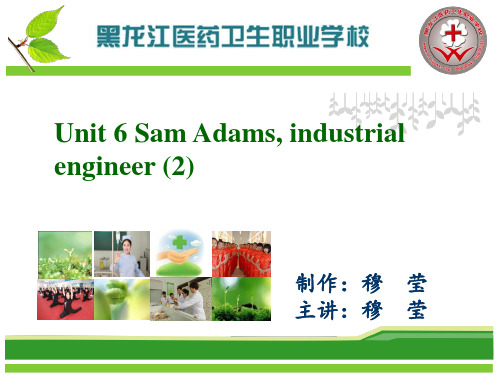
how she happened to be on the spot.
upper:
(1)situated above another(esp.similar)part eg:Students travel the cheap lower deck and tourists the upper. (2)higher in place or position eg:Many of the British upper classes are no longer very rich.
小先生:
New lesson 新课讲授:
Useful Expressions 1. 着手做某事 set out to do sth.
2. 结果是 turn out
3. 工业工程师 industrial engineer 4. 工业管理 industrial engineering
17. 跟上 come up with 18. 心不在焉 absent-minded 19. 生产流水线/装配线 the assembly line 20. 工作流程 work flow
21. 背景音乐 background music
22. 美化乏味的环境
beautify the dull setting
23. 一位多产作家
a productive writer
24. 工资增加,职位提升
pay increases and promotions
25. 夜/白班 night/day shift
26. 口头报导 oral report 27. 覆盖要点 cover the major points 28. 与时俱进 keep up with the time
大学英语精读1U6Same Adams概要
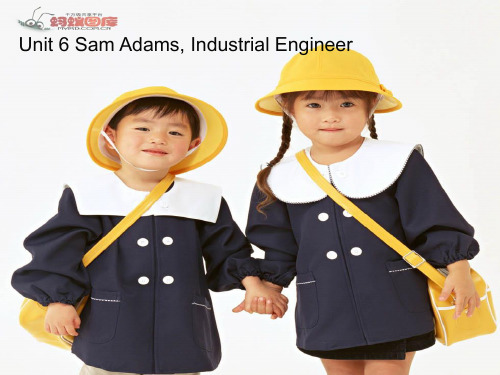
Words and expressions
1.happen to: chance; take place
S:你是怎么成为导游的?
T:How did you happen to be a tourist guide?
A. provide background music B. beautify the dull setting C. have a 15-minute break
A. Those who do not work hard should be fired. B. assembly line redesigned C. pay increase D. promotion
Unit 6 Sam Adams, Industrial Engineer
Contents
Objectives
Warming
up activities Text study words and expressions Summary Exercise Writing
Objectives
Warming-up activities
try
to answer the questions:
1.Do you think it a good habit for a person to arrange everything in order in his daily life? Why or why not? 2.Who does best in your family to keep your house clean and tidy? Say something in detail about it. 3.Do you think the habit of keeping everything in order will benefit one’s future work? Why or why not?
Book 1 Unit 6

Doctor of Laws
法学博士
6. basis: n. foundation His theory has a solid basis. What is the basis of your idea?
The two countries established
diplomatic relations on the basis
in position or rank 提升
e.g. If you work at such a slow pace, you will never be considered for promotion. After several drinks, John was bold enough to ask for a promotion.
15. fire: (1) dismiss sb. from his or
her job I’ll fire you if you are late
again. (2) shoot eg. They fired at the
enemy.
16. achieve:
(1) gain or reach by effort. 获得;
tedious
Fed up with her boring job, Mary is trying to find a new one.
13. dull a. (1) not bright nor clear 阴暗 的;暗淡的
e.g. It is fashion for young girls to be dressed in dull colors.
e.g. I want to sell this house before
Sam Adams, Industrial Engineer 大学英语教案
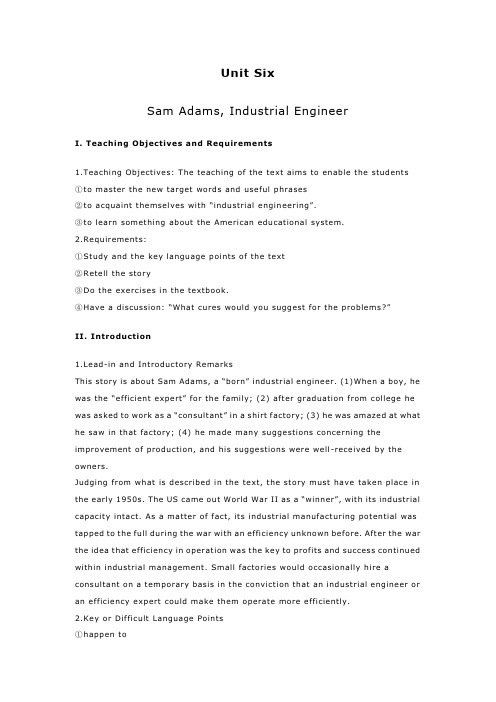
Unit SixSam Adams, Industrial EngineerI. Teaching Objectives and Requirements1.Teaching Objectives: The teaching of the text aims to enable the students①to master the new target words and useful phrases②to acquaint themselves with “industrial engin eering”.③to learn something about the American educational system.2.Requirements:①Study and the key language points of the text②Retell the story③Do the exercises in the textbook.④Have a discussion: “What cures would you suggest for the problems?”II. Introduction1.Lead-in and Introductory RemarksThis story is about Sam Adams, a “born” industrial engineer. (1)When a boy, he was the “efficient expert” for the family; (2) after graduation from college he was asked to work as a “consultant” in a shirt factory; (3) he was amazed at what he saw in that factory; (4) he made many suggestions concerning the improvement of production, and his suggestions were well-received by the owners.Judging from what is described in the text, the story must have taken place in the early 1950s. The US came out World War II as a “winner”, with its industrial capacity intact. As a matter of fact, its industrial manufacturing potential was tapped to the full during the war with an efficiency unknown before. After the war the idea that efficiency in operation was the key to profits and success continued within industrial management. Small factories would occasionally hire a consultant on a temporary basis in the conviction that an industrial engineer or an efficiency expert could make them operate more efficiently.2.Key or Difficult Language Points①happen to②come in③on a short-term basis④whatsoever⑤except for⑥go/be on strike⑦hold up⑧cover⑨result in/result from⑩keep up with3.Outline of the StoryThis story tells us something about Sam Adams, a “born” industrial engineer. When he was still a little boy, he was very neat, well organized and efficient in his family. It was these good qualities that made him an industrial engineer and helped him a lot when being asked to work as a consultant in a shirt factory after graduation from college. He had an efficient way of survey and making many suggestions concerning the improvement of production. His suggestions were well received by the owners of the fact ory.4.Procedure and Approach①Ask the students to preview the story before class. Then ask the students to answer the introductory questions to check how well the stu dents are prepared for the lesson and also to help them to obtain a general idea of the story.②Introduce the Story by:i. Telling the students that this text can be roughly divided into four sections: Section 1: the first 4 paragraphs; Section 2: paragr aphs 5&6; Section 3: paragraphs 7-10; Section 4 the remaining paragraphs.ii. Putting down on the blackboard the following question: What is the main idea for each section?iii. Giving the students 5 minutes or so to go over the whole text, then asking the students to tell the main idea of each section.iv. Summing up by way of delivering an introduction to the text.III. Detailed Study of the Story1. If you ask my mother how I happened to become an industrial engineer, she'll tell you that I have always been one: If you ask my mother how I chanced to bean industrial engineer, she'll t ell you that I was a “born” industrial engineer.①how I happened to: what led me to; how it came about that I became_The reporters are eager to know how she happened to be on the spot.②Happen to: have chance to; occur or take place by chance-How did you happen to be an English teacher?-I happened to meet an old friend of mine on the street.2.She means that I have always wanted everything to be well organized an d neat. Neat: tidy; cleverly said or done-He was always neat about his appearance.-You have done a neat job. Congratulations!-That is a neat idea3.In fact, I was the efficiency expert for the whole family.①“Efficiency expert” is a special term, referring to a person who specializes in time and motion studies, i.e., in observing the actions of an individual involved in one single operation of the manufacturing of an item, and is concerned for the overall efficiency of production throughout each aspect of the manufacturing process. In our story the expression is humorously used to mean that Sam made sure that everything in his family was well-organized and that all family members fulfilled their share of dome stic work in the most efficient way. “Efficiency expert” is a “noun + noun” combination, in which the first noun modifies the second. There are many other examples of such combinations in the text: work flow, quality control inspection, assembly line, and machine operator.②expert: (n) a person with special training in a certain field; (adj.) skillful_He is an expert at chess.-He is expert at chess/in playing chess.4.I used to organize my father's tools, my mother's kitchen utensils, my sister's boyfriends: I often arranged my father's tools and my mother's kitchen utensils in place. I even helped my sister have a date with her boyfriends.①used to-He used to watch TV programs each evening, but now he studies instead.-That woman didn't use to look so fat ten years ago.-Did you use to do morning exercises/Used you to do morning exercises?6. So he asked me to come in on a short-term basis as a consultant: So he asked me to work for a period of time in his factory as a consultant.①come in: have or find a place; have a part to play; take one's position in game or at work-The second player was very nervous as he came in.-I understand your plan perfectly, but I don't see where I come in.-Workers hope his coming in will improve the conditions of their life.②on a short-term basis: temporarily; for a period of time-The delegation of our college will pay a visit to America on a short-term basis. -to pay on a piece-work basis-to hold a job on a full-time basis-The two countries established diplomatic rela tions on the basis of equality andmutual benefits.7. I was really amazed at what I saw: All I saw in the factory made me really surprised.Be amazed at/by: be greatly surprised(often pleasantly) at/by-The teacher was amazed at his rapid progress in s tudies.-She was amazed at the fantastic design.8. Most curious of all, there was no quality control whatsoever: What made me very strange was that there was no one in the factory to control the quality of the products.①most curious of all: what is most curious of all. Simi lar examples: most important of all, most of all, and worst of all, etc.②whatsoever: at all (more emphatic than whatever, usually used in negative construction) 什么… 就… 什么;什么… 都-Nothing whatsoever can prevent us from carrying out this plan.-Is there any chance whatsoever?-There can be no doubt whatsoever about it.9. As a result some of the shirts that were put in boxes for shipment were missing one or two buttons, the collar, even a sleeve s ometimes!As a result: because (of); therefore-The plane did not take off as a result of the bad weather.10. Except for a half hour at lunchtime, there were no breaks in the day to relieve the boring work.①except for: apart from; not including-This flat is in perfect condition except for the small wai ting room.-Except for its high cost, this type of machine would be very suitable.②except for vs. exceptexcept for 强调在说明基本情况之后,在细节上加以修正;except 指从总体中除去一部分,其后可接名词或从句。
《大学英语精读》第一册 unit6

Detailed Reading
New Words and Expressions
• basis (基础,根据)主要用于比 喻,也指信念,议论等的根据. • The basis of his opinion is something he read in the paper . 他的意见的根据是从报纸上看 来的.
Industrial engineering and Industrial engineer
• Industrial engineering is the detailed analysis of the use and the cost of man material and equipment in an organization, with a view to increasing its productivity profit and efficiency. Those who are involved in this kind of analysis are called industrial engineers. • Engineers can be classified into many types, such as construction engineer, production engineer design engineer and industrial engineer. • An industrial engineer’s duties are to coordinate personnel, materials and machinery and to determine the most productive and efficient use of each. He helps plan the production line and designs or adapts details essential to the manufacturing of a product.
ce1-6
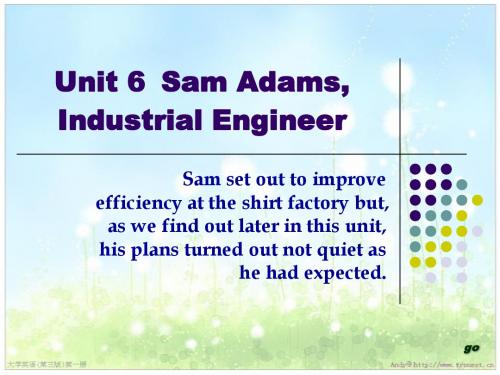
2
3. Detailed reading
1. 2. 3. 4. 5. 6. 7.
…how I happened to become an industrial ... …and pants, neatly folded, in the bottom drawer. Everything was always in its place. I finished my bachelor's degree at the university. Mr. Hobbs, a friend of my father's, owned … … come in on a short-term basis as a consultant. I was really amazed at what I saw.
4. Picture talk
①
②
③
④
5. Inspiring quotations
1. Work has a bitter root but sweet fruit. 工作是苦的根,甜的果. 工作是苦的根,甜的果. 2. The more wit, the less courage. 初生牛犊不怕虎. 初生牛犊不怕虎. 3. Listen more, talk less. Talk less, do more. 多听少说.少说多做. 多听少说.少说多做. 4. Opportunity, sooner or later, comes to all who work and wish. 只要努力工作而有志向,机会迟早终会来临. 只要努力工作而有志向,机会迟早终会来临.
go
Unit 6 Sam Adams, Industrial Engineer
Sam Adams, Industrial Engineer 大学英语教案
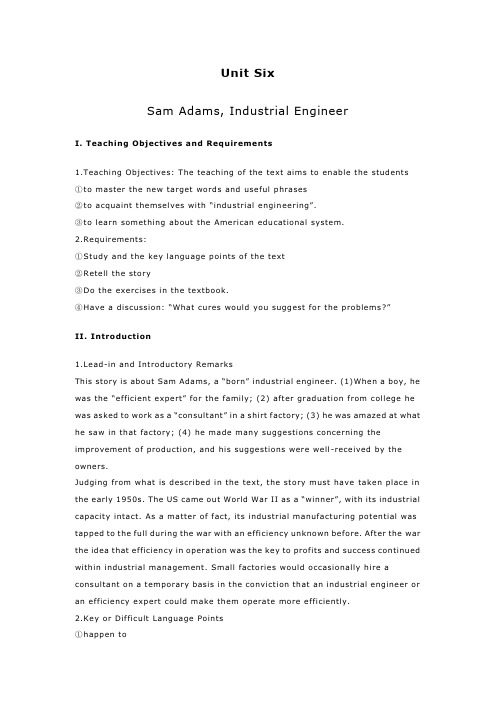
Unit SixSam Adams, Industrial EngineerI. Teaching Objectives and Requirements1.Teaching Objectives: The teaching of the text aims to enable the students①to master the new target words and useful phrases②to acquaint themselves with “industrial engin eering”.③to learn something about the American educational system.2.Requirements:①Study and the key language points of the text②Retell the story③Do the exercises in the textbook.④Have a discussion: “What cures would you suggest for the problems?”II. Introduction1.Lead-in and Introductory RemarksThis story is about Sam Adams, a “born” industrial engineer. (1)When a boy, he was the “efficient expert” for the family; (2) after graduation from college he was asked to work as a “consultant” in a shirt factory; (3) he was amazed at what he saw in that factory; (4) he made many suggestions concerning the improvement of production, and his suggestions were well-received by the owners.Judging from what is described in the text, the story must have taken place in the early 1950s. The US came out World War II as a “winner”, with its industrial capacity intact. As a matter of fact, its industrial manufacturing potential was tapped to the full during the war with an efficiency unknown before. After the war the idea that efficiency in operation was the key to profits and success continued within industrial management. Small factories would occasionally hire a consultant on a temporary basis in the conviction that an industrial engineer or an efficiency expert could make them operate more efficiently.2.Key or Difficult Language Points①happen to②come in③on a short-term basis④whatsoever⑤except for⑥go/be on strike⑦hold up⑧cover⑨result in/result from⑩keep up with3.Outline of the StoryThis story tells us something about Sam Adams, a “born” industrial engineer. When he was still a little boy, he was very neat, well organized and efficient in his family. It was these good qualities that made him an industrial engineer and helped him a lot when being asked to work as a consultant in a shirt factory after graduation from college. He had an efficient way of survey and making many suggestions concerning the improvement of production. His suggestions were well received by the owners of the fact ory.4.Procedure and Approach①Ask the students to preview the story before class. Then ask the students to answer the introductory questions to check how well the stu dents are prepared for the lesson and also to help them to obtain a general idea of the story.②Introduce the Story by:i. Telling the students that this text can be roughly divided into four sections: Section 1: the first 4 paragraphs; Section 2: paragr aphs 5&6; Section 3: paragraphs 7-10; Section 4 the remaining paragraphs.ii. Putting down on the blackboard the following question: What is the main idea for each section?iii. Giving the students 5 minutes or so to go over the whole text, then asking the students to tell the main idea of each section.iv. Summing up by way of delivering an introduction to the text.III. Detailed Study of the Story1. If you ask my mother how I happened to become an industrial engineer, she'll tell you that I have always been one: If you ask my mother how I chanced to bean industrial engineer, she'll t ell you that I was a “born” industrial engineer.①how I happened to: what led me to; how it came about that I became_The reporters are eager to know how she happened to be on the spot.②Happen to: have chance to; occur or take place by chance-How did you happen to be an English teacher?-I happened to meet an old friend of mine on the street.2.She means that I have always wanted everything to be well organized an d neat. Neat: tidy; cleverly said or done-He was always neat about his appearance.-You have done a neat job. Congratulations!-That is a neat idea3.In fact, I was the efficiency expert for the whole family.①“Efficiency expert” is a special term, referring to a person who specializes in time and motion studies, i.e., in observing t he actions of an individual involved in one single operation of the manufacturing of an item, and is concerned for the overall efficiency of production throughout each aspect of the manufacturing process. In our story the expression is humorously used to m ean that Sam made sure that everything in his family was well-organized and that all family members fulfilled their share of domestic work in the most efficient way. “Efficiency expert” is a “noun + noun” combination, in which the first noun modifies the second. There are many other examples of such combinations in the text: work flow, quality control inspection, assembly line, and machine operator.②expert: (n) a person with special training in a certain field; (adj.) skillful_He is an expert at chess.-He is expert at chess/in playing chess.4.I used to organize my father's tools, my mother's kitchen utensils, my sister's boyfriends: I often arranged my father's tools and my mother's kitchen utensils in place. I even helped my sister have a date with her boyfriends.①used to-He used to watch TV programs each evening, but now he studies instead.-That woman didn't use to look so fat ten years ago.-Did you use to do morning exercises/Used you to do morning exercises?6. So he asked me to come in on a short-term basis as a consultant: So he asked me to work for a period of time in his factory as a consultant.①come in: have or find a place; have a part to play; take one's position in game or at work-The second player was very nervous as he came in.-I understand your plan perfectly, but I don't see where I come in.-Workers hope his coming in will improve the conditions of their life.②on a short-term basis: temporarily; for a period of time-The delegation of our college will pay a visit to America on a short-term basis. -to pay on a piece-work basis-to hold a job on a full-time basis-The two countries established diplomatic relations on the basis of equality andmutual benefits.7. I was really amazed at what I saw: All I saw in the fa ctory made me really surprised.Be amazed at/by: be greatly surprised(often pleasantly) at/by-The teacher was amazed at his rapid progress in studies.-She was amazed at the fantastic design.8. Most curious of all, there was no quality control whatso ever: What made me very strange was that there was no one in the factory to control the quality of the products.①most curious of all: what is most curious of all. Simi lar examples: most important of all, most of all, and worst of all, etc.②whatsoever: at all (more emphatic than whatever, usually used in negative construction) 什么… 就… 什么;什么… 都-Nothing whatsoever can prevent us from carrying out this plan.-Is there any chance whatsoever?-There can be no doubt whatsoever about it.9. As a result some of the shirts that were put in boxes for shipment were missing one or two buttons, the collar, even a sleeve sometimes!As a result: because (of); therefore-The plane did not take off as a result of the bad weather.10. Except for a half hour at lunchtime, there were no breaks in the day to relieve the boring work.①except for: apart from; not including-This flat is in perfect condition except for the small wai ting room.-Except for its high cost, this type of machine would be very suitable.②except for vs. exceptexcept for 强调在说明基本情况之后,在细节上加以修正;except 指从总体中除去一部分,其后可接名词或从句。
unit 6 Sam Adams, Industrial Engineer

15. Absent-minded adj. 心不在焉的 • Absent adj. 缺席,心不在焉的 16. Assembly line 装配线 17. Recognize v.认出,识别,承认 • Recognition n. • receive popular recognition • 得到普遍赞赏
True or False
1) Sam liked neatness when he was a child. (
T
)
2) Sam said that he was modest enough to take other’s advice. ( F )
bossy---modest
3) Mr. Hobbs owned a big and efficient factory. ( F ) small---big 4) There was no quality control in the factory. ( T )
27. Incentive n. 刺激,动机 • incentive system奖励制度,激励制度 e.g. There is little or no incentive to adopt such measures. 28. Suggestion n. 建议【可数 • Advice n. 建议【不可数 e.g. Someone came out with a most usefulr False
9) Sam believed that the workers would be more efficient if they had two coffee breaks. ( T ) 10) Mr. Hobbs was not pleased with Sam’s report and immediately sent him away. ( F )
大学英语精读1U6Same Adams讲解

Before Reading
Global Reading Detailed Reading
After Reading
Discussion
Directions: Discuss the following questions and fill in the table.
1. What are the problems of the factory? 2. What are the solutions to the problems suggested . by Sam Adams?
S:你是怎么成为导游的?
T:How did you happen to be a tourist guide?
Objectives
talk about your good habits in daily life find out qualities for future career develop a passage of time sequence Learn to write a letter of complain
After Reading
Problems
3. The walls of the workroom are a dull gray color; there are no breaks in the day; there is no music; the workers easily get bored.
A. Those who do not work hard should be fired. B. assembly line redesigned C. pay increase D. promotion
Words and expressions
Unit 6 Sam Adams, Industrial Engineer课文翻译大学英语一

Unit 6 Sam Adams, Industrial EngineerSan set out to improve efficiency at the shirt factory but, as we find out later in this unit, his plans turned out not quite as he had expected.If you ask my mother how I happened to become an industrial engineer, she'll tell you that I have always been one.She means that I have always wanted everything to be well organized and neat. When I was still in elementary school, I liked to keep my socks in the upper left-hand drawer of my bureau, my underwear in the upper right drawer, shirts in the middle drawer, and pants, neatly folded, in the bottom drawer.In fact, I was the efficiency expert for the whole family. I used to organize my father's tools, my mother's kitchen utensils, my sister's boyfriends.I needed to be efficient. I wanted to be well organized. For me, there was a place for everything and everything was always in its place. These qualities gave me a good foundation for a career in industrial engineering.Unfortunately, I was also a bit bossy and I wasn't a very good listener. You'll see what I mean when I tell you about the first project I ever did after I finished my bachelor's degree at the university.After graduation I returned home to my small town in Indiana. I didn't have a job yet. Mr. Hobbs, a friend of my father's, owned a small shirt factory in town. Within the past five years it had grown from twenty to eighty workers. Mr. Hobbs was worried that his plant was getting too big and inefficient, so he asked me to come in on a short-term basis as a consultant.I went to the plant and spent about a week looking around and making notes. I was really amazed at what I saw.Most curious of all, there was no quality control whatsoever. No one inspected the final product of the factory. As a result some of the shirts that were put in boxes for shipment were missing one or two buttons, the collar, even a sleeve sometimes!The working conditions were poor. The tables where the workers sat were very high and uncomfortable. Except for a half hour at lunchtime, there were no breaks in the day to relieve the boring work. There was no music. The walls of the workrooms were a dull gray color. I was amazed that the workers hadn't gone on strike.Furthermore, the work flow was irregular. There was one especially absent-minded young man in the assembly line who sewed on buttons. After a while I recognized him as "Big Jim," who used to sit behind me in math class in high school. He was very slow and all the shifts were held up at his position. Workers beyond him in line on his shift had to wait with nothing to do; therefore, a great deal of time and efficiency were lost as Big Jim daydreamed while he worked. All week I wondered why he wasn't fired.After I made observations for a week, Mr. Hobbs asked me for an oral report of my findings. I covered my major points by telling him the following:"If you have a quality control inspection, you will greatly improve your finished product.""If the assembly line is redesigned, a smooth work flow can be achieved and time and energy can be saved.""If you decrease the height of the worktables, the machine operators will work more comfortably.""If the management provides pleasant background music and beautifies the dull setting, the factory will be much more productive.""If the workers have a fifteen-minute coffee break in the morning and afternoon, they will be more efficient.""If excellent work results in frequent pay increases or promotions, the workers will have greater incentive to produce."Mr. Hobbs thanked me for this report and told me he would talk over my suggestions with his brother, the co-owner and manager of the factory. "We're interested in progress here," he said. "We want to keep up with the times."He also gave me a check for $ 100 and a box of shirts with his compliments.萨姆着手提高衬衫厂的效率了,但正如我们将在本单元后半部分发现的,他的计划实施结果跟他原先预料的并不完全一样。
Sam Adams, Industrial Engineer

i_n_d_u_s_tr_ia_l_e_n_g_i_n_e_e_rs_ .
Engineers can be classified into many types, such as _c_o_ns_t_r_u_ct_io_n_engineer, _p_ro_d_u_c_t_io_n_ engineer, _d_e_s_ig_n_ engineer and _in_d_u_s_t_ri_a_l engineer.
Sam Adams, Industrial Engineer
Defining the term
• industrial engineering • industrial engineer
H9o/2m3/e2020
College English I Intensive Reading
Sam Adams, Industrial Engineer
Grade 0 Grades 1-6
5 years old 6-11 years old
Junior high or Grades 7-8 12-13 years old Middle school
(senior) high Grades 9-12 14-17 years old school
College
An industrial engineer’s duties are to coordinate personnel, _m_a_t_e_ri_a_ls_ and _m_a_c_h_i_n_e_ry_ and to determine the most _p_ro_d_u_c_t_iv_e_ and e_f_fi_c_ie_n_t_ use of each. He
大学英语第一册Unit 6 (Final Version)
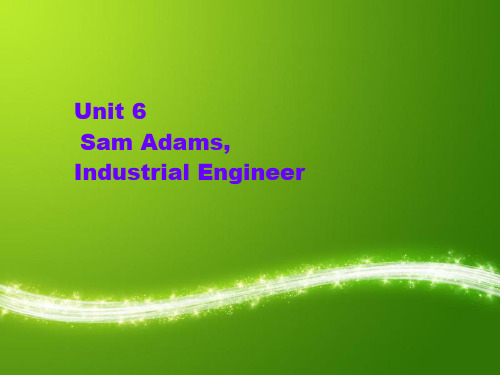
Bureau:
1. a government department e.g. public security bureau 公安局 2. a business office, esp. one that collects and /or keeps facts e.g. an information bureau 资料室,传达室
Comprehension of the Text
5. The assembly line work flow was regular. 6. Sam believed that the plant’s worktables were too low. 7. During his first week in the factory, Sam painted pictures on the wall. 8. Mr. Hobbs was not pleased with Sam’s report and immediately sent him away.
Information Related to the Text
American educational system
Grade 0 Grades 1-6
Kindergarten Grade Elementary school
5 years old 6-11years old
Junior high Or middle school
Teaching Steps
Lead-in Questions & Introduction Information Related to the Text Read Aloud the New Words Comprehension of the Text Explanation of the Text Key to the Exercises
大学英语1教案UNIT6
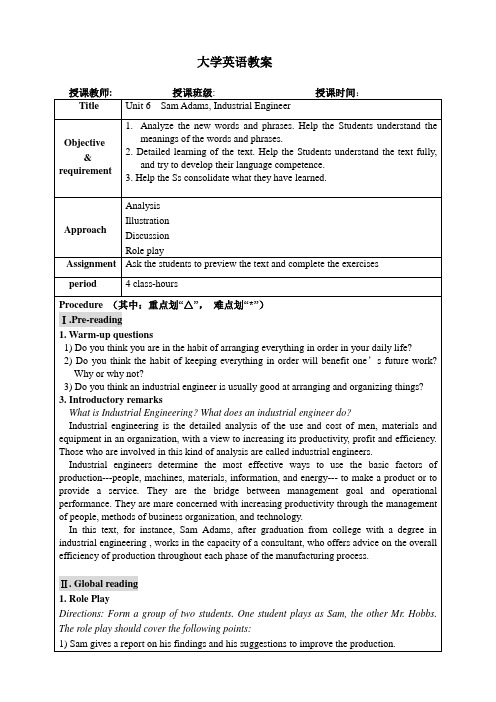
21-38
Sam was greatly surprised by the degree of disorder.
4
39-56
Sam put forward some suggestions for the improvement of production and was rewarded by the boss.
Ⅰ.Pre-reading
1. Warm-up questions
1) Do you think you are in the habit of arranging everything in order in your daily life?
2) Do you think the habit of keeping everything in order will benefit one’s future work? Why or why not?
Industrial engineers determine the most effective ways to use the basic factors of production---people, machines, materials, information, and energy--- to make a product or to provide a service. They are the bridge between management goal and operational performance. They are mare concerned with increasing productivity through the management of people, methods of business organization, and technology.
unit 6 sam adams an industrial engineer
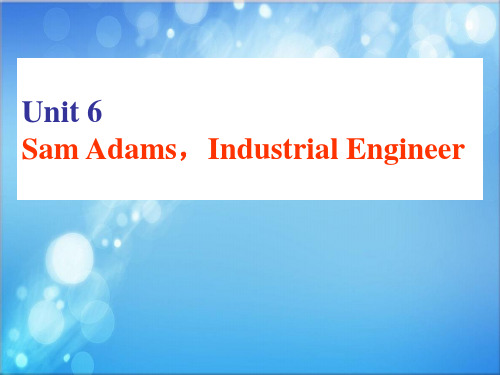
• except: 侧重于从整体里减去,一般表示同类之间的关系,
也就是说except后接的词同句子中前面的某个词或某些词一 般是同类的。except 经常接名词、代词、副词、短语以及从 句等。
• • • • • •
1) except 2) except for 3) except 4) except for 5) except 6) except for
Unit 6 Sam Adams,Industrial Engineer
• efficient adj. 效率高的 • industry n. 工业;勤勉 • industrial 工业的;勤勉的
• efficiency expert: 一个效率很高的人
• • • • • • • • 本词组是一个“名词+名词”的结构。 本课中,作者用了很多这种结构: 例如: 厨房用具 衬衣工厂 质量控制 生产流程 装配线
• 我可以实事求是地说我对皇室一点都不感兴趣。 • (用在no+名词、nothing、none等之后,以加强语气。)
• productive: adj. 多产的,富有成效的 • Jefferson was a productive and talented writer.
• 他们很努力, 但效率不太高。
• She is an English major at college.
• V.主修(in);专攻 • He majored in finance at Claremont Men's College in California.
• 他在加利福尼亚州的克莱尔蒙特男子学院主修金融专业。
except for:除了…以外 • The carpet is good except for its price.
CE L6

e.g. people from working-class background against(衬托) the brilliant background of blue sky 衬托) Background music is intended to create a comfortable atmosphere, permitting a person to continue shopping, walking or talking without being distracted.
10. the activity of checking that products are all of satisfactory standard and quality quality control
e.g. quality education the cloth of poor quality a man of fine quality
Give the solutions to the problems. Product quality: select a quality controller to check the finished products regulate a set of rules to guarantee quality check the final products before shipment trace back and find out where responsibility lies
e.g. short-term memory short-term plan short-term goal
7. 1) the scenery or ground behind the main object or event 2) your background is the kind of family you come from and the kind of education you have had
- 1、下载文档前请自行甄别文档内容的完整性,平台不提供额外的编辑、内容补充、找答案等附加服务。
- 2、"仅部分预览"的文档,不可在线预览部分如存在完整性等问题,可反馈申请退款(可完整预览的文档不适用该条件!)。
- 3、如文档侵犯您的权益,请联系客服反馈,我们会尽快为您处理(人工客服工作时间:9:00-18:30)。
• V.主修(in);专攻 • He majored in finance at Claremont Men's College in
California. 10
• 他在加利福尼亚州的克莱尔蒙特男子学院主修金融专业。
ቤተ መጻሕፍቲ ባይዱ
except for:除了…以外
• 在世界上大多数城市里,繁忙的交通是个大问题。
• Heavy traffic is a major problem in most cities all over the world.
• n.主修科目
• I'm changing my major to political science.
• 在大学里,她是英语专业的学生。
• 得到提升
• engage in promotion
• 从事商品推销
• seek promotion
• 谋求升迁
• health promotion
• 增进健康
• sales promotion
• 推销
9
• major
• adj.主要的,重要的
• The factory’s inefficiency is a major problem.
• 你只要做出成绩, 就能指望获得提升。
• If you are successful, you can expect promotion.
• 2) 促销 • 他负责推销工作。
• He is responsible for sales promotion.
8
• Collocation: • attain/gain/get/obtain/receive promotion
• 本课中,作者用了很多这种结构:
• 例如:
• kitchen utensils
• 厨房用具
• shirt factory
• 衬衣工厂
• quality control
• 质量控制
• work flow
• 生产流程
• assembly line
• 装配线
• machine operators
• 机器操作人员
• embarrass embarrassing embarrassed
• astonish astonishing astonished
• 英语中有关人的情绪表达的动词的现在分词和过去分词 做形容词。
• interest, amuse, frighten, excite, confuse, charm, encourage, shock, terrify,refresh, convince, annoy, disgust, move, depress等
• 我可以实事求是地说我对皇室一点都不感兴趣。 • (用在no+名词、nothing、none等之后,以加强语气。)
6
• productive: adj. 多产的,富有成效的 • Jefferson was a productive and talented writer.
• 他们很努力, 但效率不太高。
• pron. 无论什么;任何(事物);诸如此类
• Anyone seen carrying bags, boxes, or whatsoever, was stopped by the police.
• 任何被看到背包的,拿箱子的,或者诸如此类的东西都被警察拦住了。
• Whatsoever she does is very ridiculous.
• They work hard, but their efforts are not very productive.
• The meeting was very productive.
7
• promotion: n
• 1) 晋升
• There are good chances of promotion in this firm.
• The carpet is good except for its price.
• 除了看门人以外,那房子空荡荡的。
• The house is deserted, except for the keeper. • except for: 指对某种基本情况进行具体的细节方面的修
正,后接的词同句子中前面的某个词或某些词不是同类的, 指从整体中除去一个细节,一个方面。
4
• be amazed at / by: 对…非常吃惊 • We were absolutely amazed at his rapid recovery. • She is amazed by what you have told her.
• 她对你告诉她的事感到吃惊。
5
• whatsoever:
Unit 6 Sam Adams,Industrial Engineer
1
• efficient adj. 效率高的 • industry n. 工业;勤勉 • industrial 工业的;勤勉的
2
• efficiency expert: 一个效率很高的人
• 本词组是一个“名词+名词”的结构。
• except, except for
• 这两个词均含“除…之外”之意。
• except: 侧重于从整体里减去,一般表示同类之间的关系
,也就是说except后接的词同句子中前面的某个词或某些词 一般是同类的。except 经常接名词、代词、副词、短语以及 从句等。
• 不管她做什么都很可笑。
• adv. at all 丝毫地
• I have no reason whatsoever to doubt what he says.
• 我没有任何理由怀疑他说的一切。
• I can honestly say that I have no interest whatsoever in the royal family.
• background music
• 背景音乐
• coffee break
• 休息时间
• math class
• 数学课
3
• amaze vt. 使大为吃惊,使惊愕
• amazing adj.令人吃惊的
• amazed adj. 吃惊的
• relieve relieving relieved
• bore boring bored
